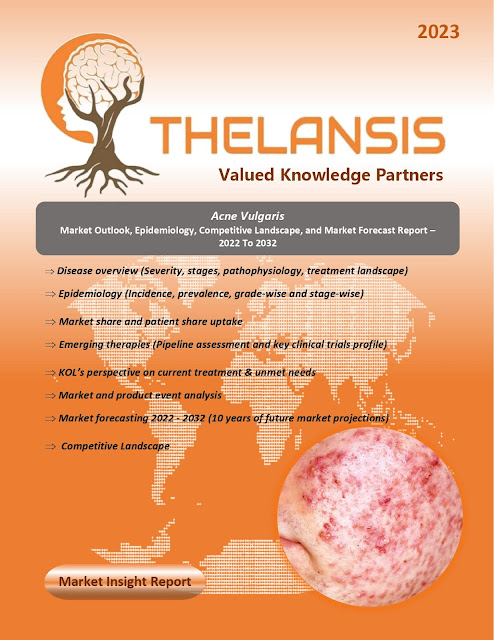Glioblastoma (GBM) – Market Outlook, Epidemiology, Competitive Landscape, and Market Forecast Report – 2023 To 2033
Glioblastoma
(GBM) is the most aggressive among the diffuse gliomas originating from the
astrocytic lineage. It ranks as the most prevalent malignant primary brain
tumor, comprising 54% of all gliomas and 16% of primary brain tumors. GBM is
classified as a malignant astrocytic tumors, earning a Grade IV designation
according to the WHO classification. The exact cause of this disease remains
unknown, except in cases where it emerges following therapeutic brain
irradiation for other conditions. The genetic anomalies identified, such as
EGFR gene amplification (7p12), TP53 gene mutations (17p13.1), and chromosome
10 loss, vary depending on the tumor's nature: primary glioblastoma (de novo)
or secondary glioblastoma (arising from a benign astrocytic tumor). Glioblastomas
can develop at any age. They are most commonly observed in patients between 45
and 70, making up 70% of cases in this age group. Typically, these tumors are
situated in the brain hemispheres but can occur throughout the central nervous
system. The disease often exhibits rapid progression, usually 2 to 3 months,
except in cases where it evolves from a pre-existing low-grade astrocytoma
(secondary glioblastoma). Primary treatment typically involves surgery to
confirm the diagnosis via biopsy or maximize tumor removal. Complete resection
is rarely achievable due to the tumor's tendency to infiltrate the surrounding
brain tissue. Following surgery, treatment continues with targeted radiotherapy
focused on the tumor site, often supplemented with chemotherapy involving
nitrosoureas and temozolomide. Adjuvant therapies post-surgery yield
significant benefits in terms of survival, albeit with modest outcomes. In
cases of relapse, second-line chemotherapy or repeat surgery may be considered.
Given the tumor's relative rarity, managing glioblastoma patients necessitates
a multidisciplinary approach from neuro-oncology experts within prospective
studies to enhance patient survival and quality of life. In the absence of
gross total resection in elderly patients and cases of severe neurological
deficits, the prognosis is poor.
Thelansis’s
“Glioblastoma (GBM) Market Outlook, Epidemiology, Competitive Landscape, and
Market Forecast Report – 2023 To 2033" covers disease overview,
epidemiology, drug utilization, prescription share analysis, competitive
landscape, clinical practice, regulatory landscape, patient share, market
uptake, market forecast, and key market insights under the potential Glioblastoma
(GBM) treatment modalities options for eight major markets (USA, Germany,
France, Italy, Spain, UK, Japan, and China).
KOLs insights of Glioblastoma (GBM)
across 8 MM market from the centre of Excellence/ Public/ Private hospitals
participated in the study. Insights around current treatment landscape,
epidemiology, clinical characteristics, future treatment paradigm, and Unmet
needs.
Glioblastoma
(GBM) Market Forecast Patient Based Forecast Model (MS. Excel Based
Automated Dashboard), which Data Inputs with sourcing, Market Event, and
Product Event, Country specific Forecast Model, Market uptake and patient share
uptake, Attribute Analysis, Analog Analysis, Disease burden, and pricing
scenario, Summary, and Insights.
Thelansis Competitive Intelligence (CI) practice
has been established based on a deep understanding of the pharma/biotech
business environment to provide an optimized support system to all levels of
the decision-making process. It enables business leaders in forward-thinking
and proactive decision-making. Thelansis supports scientific and commercial
teams in seamless CI support by creating an AI/ ML-based technology-driven
platform that manages the data flow from primary and secondary sources.
Tags: Glioblastoma
(GBM), Glioblastoma (GBM) market outlook, Glioblastoma
(GBM) competitive landscape, Glioblastoma
(GBM) market forecast, Thelansis, Primary market
research, KOL insights, Competitive Intelligence (CI)




Comments
Post a Comment